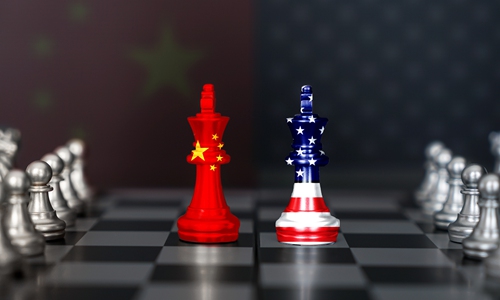HOME >> OPINION
China warns US with sanctions on NGOs
Source:Global Times Published: 2019/12/3 22:53:42

Photo: VCG
Chinese Foreign Ministry Spokesperson Hua Chunying said at a routine press conference on Monday that "the Chinese government decides to suspend reviewing requests of US military vessels and aircraft to visit Hong Kong" starting from Monday, and "to impose sanctions on NGOs that played an egregious role in the recent disturbance related to an amendment bill in Hong Kong."The announcement came after US President Donald Trump signed the so-called Hong Kong Human Rights and Democracy Act on November 27. The act interferes in China's internal affairs and violates international law and the basic principles of foreign relations.
This is probably the first time China has imposed sanctions on multiple organizations because of their interference in the country's domestic affairs. It is by far China's most powerful countermeasure against foreign forces on the Hong Kong issue. Although Beijing has not announced specific sanctions, the country has backup plans. The sanctions may be just the beginning and send two signals.
First, by imposing sanctions on NGOs, China has sent a strong warning to other organizations which attempt to interfere in Hong Kong. Second, China has made it clear that it will take real steps, and Washington should not underestimate Beijing's resolve to safeguard its national security.
China had refused to allow US warships to dock in Hong Kong in August. By suspending review of the request by US military vessels and aircraft this time, China has underscored its determination - If the US does not take China's stance seriously, the two countries' engagements in other fields will be affected. China is telling the US that no country can interfere in China's internal affairs.
The NGOs slapped with sanctions include the National Endowment for Democracy, the National Democratic Institute for International Affairs, the International Republican Institute, Human Rights Watch and Freedom House.
Although China has not announced how these NGOs will be sanctioned specifically, it is likely these organizations will be banned from getting involved in any activities in China. The visa applications of the staff of these NGOs may also be rejected. Chinese NGOs and individuals who cooperate with these organizations may be sanctioned. China may also completely cut off any financial transactions of these NGOs in the country, including in Hong Kong and Macao.
China's sanctions are timely. They repudiate brutal US interference and make relevant US organizations and individuals understand the consequences of interfering in China's internal affairs. The sanctions can crush US arrogance.
As for the situation in Hong Kong is concerned, the sanctions are not only a proactive move to stop external interference, but will also have a deterrent effect on the violence by radical rioters. If the rioters continue to create chaos in Hong Kong, the central government will launch tougher measures.
If the US continues to interfere in Hong Kong affairs, China can legislate for its countermeasures in the future. For example, China can draw up a law that opposes any foreign intervention in China's internal affairs and punishes the organizations and individuals that stir up troubles in Hong Kong.
Besides, China can also keep expanding the sanctions list and add more organizations and individuals, including US senators who are extremely anti-China.
If the Trump administration carries out the provisions of the act, China can impose sanctions on senior US government officials who are in charge of related issues, and delay or cancel the two countries' dialogues in other areas.
The article was compiled by Global Times reporter Li Qingqing based on an interview with Zhang Tengjun, assistant research fellow at the China Institute of International Studies. liqingqing@globaltimes.com.cn
Posted in: VIEWPOINT